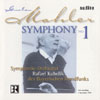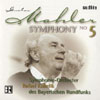Mahler Symphony No 5
A pair of Mahler [symphony] symphonies from the great Rafael Kubelik to complement his admired studio Mahler cycle
View record and artist detailsRecord and Artist Details
Composer or Director: Gustav Mahler
Label: Audite
Magazine Review Date: 4/2000
Media Format: CD or Download
Media Runtime: 52
Mastering:
ADD
Catalogue Number: 95 467

Tracks:
| Composition | Artist Credit |
|---|---|
| Symphony No. 1 |
Gustav Mahler, Composer
Bavarian Radio Symphony Orchestra Gustav Mahler, Composer Rafael Kubelík, Conductor |
Composer or Director: Gustav Mahler
Label: Audite
Magazine Review Date: 4/2000
Media Format: CD or Download
Media Runtime: 72
Mastering:
Stereo
ADD
Catalogue Number: 95 465

Tracks:
| Composition | Artist Credit |
|---|---|
| Symphony No. 5 |
Gustav Mahler, Composer
Bavarian Radio Symphony Orchestra Gustav Mahler, Composer Rafael Kubelík, Conductor |
Author: David Gutman
Kubelik made one of the earliest studio recordings of the First Symphony, with the Vienna Philharmonic for Decca in the 1950s (1/55 - nla), and, on the first appearance of his DG remake in 1968, Deryck Cooke observed that here was an essentially poetic conductor who gets more poetry out of this symphony than any of the other conductors who have recorded it. That is even truer of this 1979 account, Cooke's 'natural delicacy ' being the key to an interpretation that may offend latterday purists. Kubelik's divided violins may be back in vogue, but not his abandonment of the first movement exposition repeat; he also ignores the single repeat sign in the Landler. Does it matter that the mood seems somehow 'old-fashioned' as well - more autumnal than spring-like? One can hardly fail to be struck by the rural calm and simplicity he brings to the dreamy opening, the freshness and piquancy of the bucolic details, the birdcalls, the unfussy phrasing.
In the second movement, Kubelik keeps the music moving, as Bernstein almost fails to, yet still manages to impart a decent swing, while his Trio is a delight. Nor does he fall short in the slow movement, giving himself more time than Bernstein to impose a different but equally compelling ethnic slant. Most modern interpretations, however crisply focused, sound painfully flat after this. Only in the finale does the conductor's natural expressiveness veer towards a rhythmic slackness that saps the music of the necessary drive. The second subject, however gorgeous, is consolatory rather than rapt or yearning, the total effect something less than sensational.
By contrast, the Fifth is one of those performances that acquires charisma as it goes along. The first two movements are by no means earth-shattering, relying on the resonant recording (not quite as refined as No 1) to add gravitas to some less than committed music-making. The Scherzo is altogether more distinctive, frisky and lithe, with excellent work from the Bavarian horns. As for the Adagietto, this must now take its place among the most affecting on disc. Partisans of extreme tempos, whether fast or slow, may not like it, but Kubelik finds exactly the right pace - which is, of course, the pace that feels right for him; and his strings are possessed of an unearthly radiance. The finale of this symphony almost invariably sounds too heavy. Not so here. The conductor's rhythmic verve will surprise anyone familiar with the arthritic flailing of his later years and the conclusion is suitably vigorous.
All in all, a breath of fresh Moravian air and a wonderfully civilised alternative to the hi-tech histrionics of today's market leaders. The First Symphony sounds even better and is probably the one to go for.'
Discover the world's largest classical music catalogue with Presto Music.

Gramophone Digital Club
- Digital Edition
- Digital Archive
- Reviews Database
- Full website access
From £8.75 / month
Subscribe
Gramophone Full Club
- Print Edition
- Digital Edition
- Digital Archive
- Reviews Database
- Full website access
From £11.00 / month
Subscribe
If you are a library, university or other organisation that would be interested in an institutional subscription to Gramophone please click here for further information.




